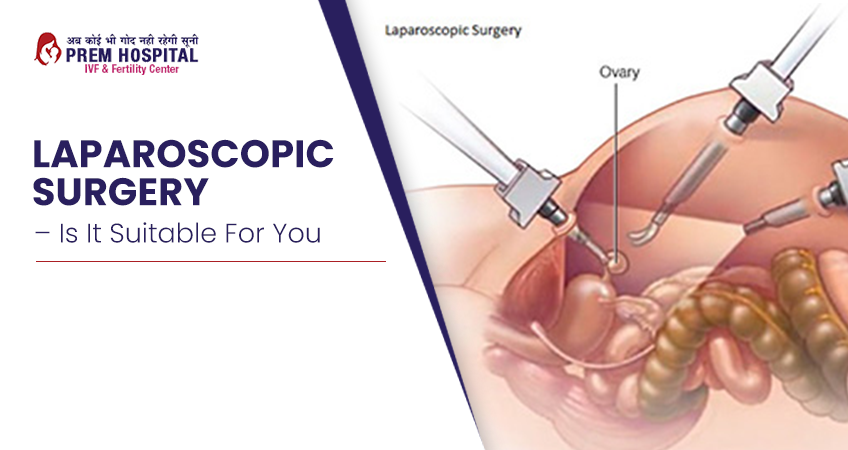Laparoscopic surgery is a process of minutely observing your abdomen and reproductive organs. Through this process, doctors can diagnose various medical conditions and take tissue samples. This process is safe with few complications.
In this minute invasive surgical process, a telescope is used with a camera attached at the end. Doctors can check your internal organs through this surgery without opening the entire body.
Laparoscopy for infertility
A telescope and other surgical instruments are inserted through the belly button in laparoscopy for infertility. Surgeons can then examine the pelvic reproductive organs closely. Such a procedure usually lasts for 35-40 minutes with the use of general anesthesia. In this process, the patient’s abdomen is inflated with nitrous oxide or carbon-di-oxide to keep the organs away from the abdomen wall. It helps doctors to examine the organs.
After inflation, the telescope is inserted into the body through a tiny incision. Doctors will then check the condition of the pelvic cavity on the screen on which internal images are transmitted.
He will look for the possible causes of infertility, which include:
- Abnormality in ovaries or uterus
- Fallopian tube status
- Scar tissue
- Fibroid tumors
Based on the problem, operative laparoscopy will be performed. Under this procedure, a small surgical device will be inserted through another incision point to remove scar tissue, endometrial tissue, or fibroids implanted incorrectly outside the uterus. Such tissues are either cut or removed through electric current and laser beam. Incisions are then closed through a few stitches. Usually, no or little scarring is involved in this process. You must choose the best IVF center in Meerut to perform everything smoothly.
When laparoscopy is used to treat infertility
Laparoscopy is usually performed in a condition when other infertility treatments are unable to give any conclusive diagnosis. Thus it is done in case of unexplained infertility. It is also performed in the condition of suspected cyst growth which may obstruct your fertility process. It is also recommended for patients who are experiencing pelvic pain, which happens because of endometriosis. Laparoscopic surgery for uterus removal is also a common process.
The risk involved in laparoscopy
Like any surgical process, laparoscopy for infertility may involve certain risks. Only 1-2% of patients may experience complications while undergoing treatment through laparoscopy. Such complications may include anesthesia-related issues or skin irritation.
Below are some more complicated issues:
- Allergic reaction
- Blood clots
- Nerve damage etc.
In some scenarios, any surgical instrument can cause harm to a woman’s pelvic organ or abdomen. While injury can happen in any patient, it is more common among women who have undergone previous abdominal surgery or those who are overweight.
Recovery time
As laparoscopy is an outpatient surgery, the patient will get discharged on the same day. In case of any further complications, hospitalization of 2-3 days will be needed. Your body will take around a week to recover completely from the surgery. Your doctor will prescribe medications for proper and speedy recovery. However, a patient may need medical attention if she experiences:
- High fever (more than 101°F)
- Pain or pus around the incision area.
- Abdominal pain or discomfort
How will you feel after laparoscopy treatment?
You will get general anesthesia during the laparoscopy so that you won’t feel pain at that time and will not remember the process. After you wake up, you may experience a sore throat. It will be because of the tube placed inside your throat, which will allow you to breathe during surgery. That tube will be removed before you wake up.
It’s normal for the area to feel sore because of the cuts, and your abdomen may experience tenderness if your doctor has removed a lot of scar tissue. You may also experience bloating because of the carbon dioxide and sharp shoulder pain. All such pains will eventually decrease in a few days.
You may require one or two weeks to recover, especially if repairs are more. Speak with your doctor about the recovery process.
What if the results are abnormal?
Your doctor will do the surgery accordingly, depending on what has happened wrong. Endometrial growths, adhesions, cysts, and fibroids are removed in many scenarios.
In case of blockage in the fallopian tube, your surgeon will try to open it if possible. If your pregnancy is ectopic, the surgeon will remove the abnormal pregnancy and will treat the damaged tissues. In some scenarios, it is required to remove the whole fallopian tube.
Future pregnancy possibilities
After surgery, your doctor will inform you about all the options to conceive. If he has removed the fibroids or repaired the fallopian tube, you will be advised to try for pregnancy naturally.
If your surgeon detects endometriosis or PID, he will remove the scar tissue and thus making it possible to conceive naturally.
But even a few months after surgery, if you find it difficult to conceive naturally, your fertility specialist doctor will guide you on other fertility treatments. Many patients nowadays are undergoing laparoscopic surgery if advised by the doctor.
If yours is an unexplained infertility, then you can also go for this surgery. Inquire about laparoscopic surgery costs for infertility to set your budget accordingly.

